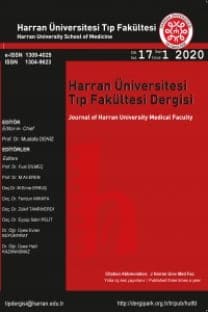Akut femur cisim kırıklarında traksiyon masası kullanmadan elle traksiyon yapılarak mini-açık intramedüller çivileme
Femoral kırıklar, Kırık sabitlenmesi, intramedüler çivileme
Mini-open intramedullar nailing of acute femoral shaft fractures using manual traction without a fracture table
___
- 1) Whittle AP. Fractures of lower extremity. In: Canale ST, Beaty JH, editors. Campbell's operative orthopaedics, Vol. 3. Chapter:51. 11th ed. MosbyElsevier,Philadelphia;2008. P.3085-3236. 2) Duman E, Ateş y. Femur cisim kırıkları. TOTBİD Dergisi 2008;7(1):1-7. 3) Liao JC, Hsieh PH, Chuang TY, Su JY, Chen CH, Chen YJ. Mini-open intramedullary nailing of acute femoral shaft fracture: reduction through a small incision without a fracture table. Chang Gung Med J. 2003;26(9):660-8. 4) Winquist RA, Hansen ST Jr, Clawson DK. Closed intramedullary nailing of femoral fractures. A report of five hundred and twenty cases.. J Bone Joint Surg Am. 1984 66(4):529-39. 5) Wolinsky PR, McCarty E, Shyr Y, Johnson K. Reamed intramedullary nailing of the femur: 551 cases. J Trauma. 1999;46(3):392-9. 6) Köseoğlu E, Durak K, Bilgen MS, Küçükalp A, Bayyurt S. Comparison of two biological internal fixation techniques in the treatment of adult femur shaft fractures (plate-screws and locked intramedullary nail). Ulus Travma Acil Cerrahi Derg. 2011;17(2):159-65. 7) Pape HC, Giannoudis P. The biological and physiological effects of intramedullary reaming. J Bone Joint Surg Br. 2007;89(11):1421-6. 8) Meldrum R, Lipscomb P. Compartment syndrome of the leg after less than 4 hours of elevation on a fracture table. South Med J. 2002;95(2):269-71. 9) Karadimas EJ, Papadimitriou G, Theodoratos G, Papanikolaou A, Maris J. The effectiveness of the antegrade reamed technique: the experience and complications from 415 traumatic femoral shaft fractures. Strategies Trauma Limb Reconstr. 2009;4(3):113-21. 10) Karpos PA, McFerran MA, Johnson KD. Intramedullary nailing of acute femoral shaft fractures using manual traction without a fracture table. J Orthop Trauma. 1995;9(1):57-62. 11) McFerran MA, Johnson KD. Intramedullary nailing of acute femoral shaft fractures without a fracture table: technique of using a femoral distractor. J Orthop Trauma. 1992;6(3):271-8. 12) Kimmatkar N, Hemnani JT, Hemnani TJ, Jain SK. Diaphyseal femoral intramedullary nailing: closing or open intervention? International Journal of scientific study. 2014; 15):15-18. http://www.ijsssn.com/uploads/2/0/1/5/20153321/ijss_feb-04.pdf 13) Russell TA, Mir HR, Stoneback J, Cohen J, Downs B. Avoidance of malreduction of proximal femoral shaft fractures with the use of a minimally invasive nail insertion technique (MINIT). J Orthop Trauma. 2008;22(6):391-8. 14) Özcan H, Tomak Y, Karaismailoğlu TN, Dabak N, Pişkin A. Erişkin femur cisim kırıkları ve psödoartrozlarının kilitli intramedüller çivileme ile tedavisi. Artroplasti Artroskopik Cerrahi. 2003;14(2):81- 88. 15) Sever GB, Karaca SG, Dursun M, Gürkan V, Karaca S. Erişkin femur cisim kırıklarında sınırlı açık redüksiyon ile antegrad kilitli intramedüller çivileme uygulamasının sonuçları. Kartal Eğitim ve Araştırma Hastanesi Tıp Dergisi. 2006;18(2):77-81. 16) Shetty S, Bangera VV, Bhandary B,Mangalore K. Mini-open intramedull interlocking nailing of fracture femur in a tertiary care center; our experience. RRJMHS. 2 0 1 3 ; 2 ( 3 ): 5 4 h t t p : / / w w w.rr o i j . c om/ jmh s/ index.php/jmhs/article/viewFile/RRJMHS39/pdf 17) Altay MA, Erturk C, Cece H, Isikan UE. Mini-open versus closed reduction in titanium elastic nailing of paediatric femoral shaft fractures: a comparative study. Acta Orthop Belg. 2011;77(2):211-7. 18) Klemm KW, Börner M. Interlocking nailing of complex fractures of the femur and tibia. Clin Orthop Relat Res. 1986;(212):89-100. 19) Altay MA, Ertürk C, Altay N, Oztürk IA, Baykara I, Sert C, Isikan UE. Comparison of intracompartmental pressures in a rabbit model of open and closed tibial fractures: an experimental study. Bone Joint J. 2013;95-B(1):111-4. 20) Stephen DJ, Kreder HJ, Schemitsch EH, Conlan LB, Wild L, McKee MD. Femoral intramedullary nailing: comparison of fracture-table and manual traction. a prospective, randomized study. J Bone Joint Surg Am. 2002;84-A(9):1514. 21) Wolinsky PR, McCarty EC, Shyr Y, Johnson KD. Length of operative procedures: reamed femoral intramedullary nailing performed with and without a fracture table. J Orthop Trauma. 1998;12(7):485-95. 22) O'Toole RV, O'Brien M, Scalea TM, Habashi N, Pollak AN, Turen CH. Resuscitation before stabilization of femoral fractures limits acute respiratory distress syndrome in patients with multiple traumatic injuries despite low use of damage control orthopedics. J Trauma. 2009;67(5):1013- 21. 23) Ertürer E, Öztürk İ, Dirik Y, Uzun M, Aksoy B. Erişkinlerdeki cisim kırıklarında kilitli oymasız intramedüller çivi osteosentezinin radyografik ve fonksiyonel sonuçları Acta Orthop traumatol Turc 2005;39:381-6.
- ISSN: 1304-9623
- Yayın Aralığı: 3
- Başlangıç: 2004
- Yayıncı: Harran Üniversitesi Tıp Fakültesi Dekanlığı
Non-Diabetik Metabolik Sendromda İCAM-1 E469K ve E-Selektin S128R Polimorfizmleri
Halit AKBAS, Elif OGUZ, Suzan TABUR, Mahmut BALKAN, Hakan KORKMAZ, Belgin ALASEHİRLİ
Normal Gebe Populasyonda İntrakardiak Ekojenik Foküs Sıklığı ve Anomaliler ile İlişkisi
Önder YENİÇERİ, Neşat ÇULLU, Mehmet DEVEER, Burcu KASAP, Emine Neşe YENİÇERİ
Meme Kitlelerinde Tru-Cut Biyopsinin Yararlılığı
Önder YENİÇERİ, Önder ÖZCAN, Neşat ÇULLU, Mehmet DEVEER
Yenidoğanda Ciddi Kalp Yetersizliğinin Nadir Bir Nedeni: Galen Ven Malformasyonu
Ali YİLDİRİM, Savaş DEMİRPENÇE, Bülent KOCA, Hasan Tolga ÇELİK, Sena ÜNVERDİ
A Rare Cardiac Mass: Late Diagnosis of a Giant İntracardiac Thrombus
Deniz DEMİR, Ümit HALICI, Mustafa ABANOZ, Selçuk BAYSAL, Mustafa KAPLANGÖRAY
Derin submandibular bölge yerleşimli lipom olgusu
Mehtap BEKER ACAY, Abdulkadir BUCAK, Ebru ÜNLÜ, Elif HOCAOĞLU, Nazan OKUR
ICAM-1 E469K and E-Selectin S128R Polymorphisms with Non-Diabetic Metabolic Syndrome
Mahmut BALKAN, Halit AKBAS, Elif OGUZ, Belgin ALASEHİRLİ, Suzan TABUR, Hakan KORKMAZ
